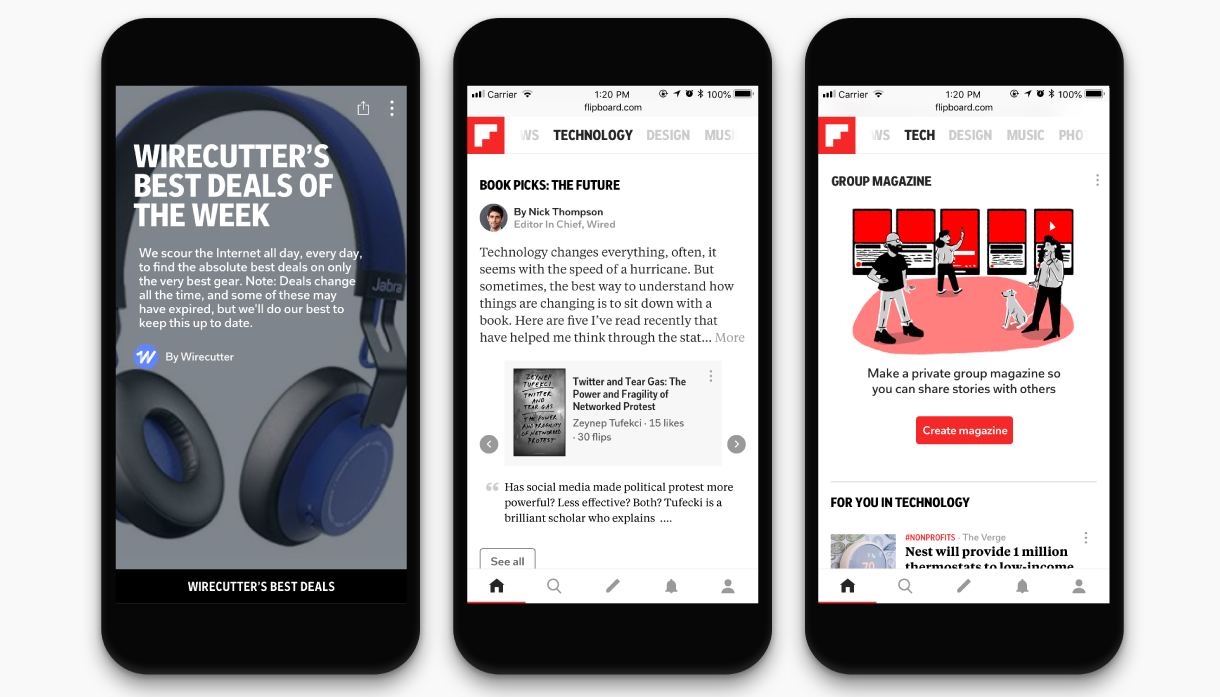 APPS
APPS
 APPS
APPS
 APPS
APPS
The social magazine service Flipboard Inc. is doubling down on tech coverage with new curation features announced today that soon will be expanded into other coverage areas.
The features, available in the Flipboard mobile app and on the web, highlight deeper, curated content from publishers such as TechCrunch and CNET, presented in a “high-density” webpage. Look out, Techmeme.
“There’s an opportunity to take different professions, starting with tech, and go deeper on the content,” Flipboard Chief Executive Mike McCue told SiliconANGLE. “We become the definitive resource for tech insiders.”
Leading the new features are new packages of curated stories from some top tech publishers, such as Features from TechCrunch, Artificial Intelligence from The Verge, and Best Deals of the Week from the New York Times’ Wirecutter tech buying guide. There are also collections from Flipboard editors, such as podcasts, opinion pieces from around the web, longer features and business news, as well as something called The Full Story that digs deeper into the day’s biggest tech story and Book Picks, a weekly series written by leading tech industry figures such as Wired Editor in Chief Nicholas Thompson.
Flipboard’s 25 or so paid journalists also compile a running list of Top Stories that run constantly on the left side of the page. The company hired former content marketer and VentureBeat staff writer Ken Yeung as a contractor in January to head the tech curation effort. That said, Flipboard does have algorithms to aid editors in discovery and curation among tens of thousands of content sources.
As always, each tech page is personalized to interests chosen in advance by each Flipboard user, though some default features rotate in and out depending on news and events in the tech industry. Taking that personalization a step further, Flipboard is also enabling the creation of private magazines for teams and invite others via email, Slack and other messaging apps to join in and share news and photos and add comments to them. These appear on users’ pages but only those that have been invited, though like any magazine people can create on Flipboard, they can be made public too. “It’s better than any algorithm we could create,” McCue said of this insider curation.
Finally there’s a new weekday morning email with a snapshot of what’s on one’s personalized news feed, including the Top Stories and the team magazines, and a Saturday email with the five book recommendations.
Tech was chosen as the first industry for this treatment because it remains one of the most-read topics by Flipboard’s 100 million monthly active users users, McCue said. “This is the beginning of us moving to the professional side,” McCue said.
Although he won’t reveal exactly what’s coming next, he mentioned that the advertising and media industry and healthcare are two industries ripe for this treatment. It could also be applied to high reader interest areas such as sports, finance, cooking, fitness and wellness.
The new features follow a self-service program for publishers announced last fall and ultrapersonalized Smart Magazines, the centerpiece of the fourth generation of its app, that were announced early last year.
Overall, McCue is looking to set an example of best practices for aggregating news, which he views as all the more important now in the age of fake news and filter bubbles. The issue came to a head recently with Facebook Inc.’s leak of the personal data of at least 85 million people to the British political consulting firm Cambridge Analytica, whose targeted ads were aimed chiefly at helping elect U.S. President Donald Trump. That forced Facebook CEO Mark Zuckerberg to appear before multiple congressional committees two weeks ago to explain the breach. The data scandal has galvanized some critics who are calling for limits on tech giants’ power.
The days of tech companies insisting they’re simply platforms with limited responsibility for content on their sites “are coming to an end,” McCue said. “We are a tech company with media values,” he added. “We have an opportunity to set the bar on what a technology company should be.”
Part of that, for better or worse, is not making as much money as Facebook. Flipboard doesn’t offer access to its platform via application programming interfaces, which avoids potential abuse, and there’s less precise targeting for advertisers. “We take a hit on revenues because of that,” said McCue, who called his company’s targeting capabilities closer to those of traditional magazines, by interests and demographics.
Support our mission to keep content open and free by engaging with theCUBE community. Join theCUBE’s Alumni Trust Network, where technology leaders connect, share intelligence and create opportunities.
Founded by tech visionaries John Furrier and Dave Vellante, SiliconANGLE Media has built a dynamic ecosystem of industry-leading digital media brands that reach 15+ million elite tech professionals. Our new proprietary theCUBE AI Video Cloud is breaking ground in audience interaction, leveraging theCUBEai.com neural network to help technology companies make data-driven decisions and stay at the forefront of industry conversations.